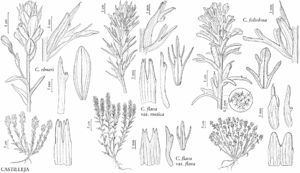Difference between revisions of "Castilleja elmeri"
Erythea 6: 51. 1898. (as Castilleia)
FNA>Volume Importer |
imported>Volume Importer |
||
| (6 intermediate revisions by 2 users not shown) | |||
| Line 6: | Line 6: | ||
|place=6: 51. 1898 | |place=6: 51. 1898 | ||
|year=1898 | |year=1898 | ||
| + | |other_info_on_pub=(as Castilleia) | ||
}} | }} | ||
|common_names=Elmer’s paintbrush | |common_names=Elmer’s paintbrush | ||
|special_status={{Treatment/ID/Special_status | |special_status={{Treatment/ID/Special_status | ||
|code=F | |code=F | ||
| − | |label= | + | |label=Illustrated |
}}{{Treatment/ID/Special_status | }}{{Treatment/ID/Special_status | ||
|code=E | |code=E | ||
| Line 31: | Line 32: | ||
|elevation=600–2600 m. | |elevation=600–2600 m. | ||
|distribution=B.C.;Wash. | |distribution=B.C.;Wash. | ||
| − | |discussion=<p>The bracts and inflorescences of Castilleja elmeri can be red, crimson, scarlet, pink, magenta, red-orange, burnt orange, orange, pale yellow, or whitish. While the coloration is highly variable between local populations, it is usually uniform and consistent within them. It is found primarily in the Wenatchee Mountains of Washington, where it is often on serpentine, but it ranges northward in the Cascades into extreme southern British Columbia, apparently on non-serpentine substrates. Hybrids with C. miniata var. miniata, C. parviflora var. albida, and C. thompsonii have been found in the eastern Cascades of Washington, and a similar hybrid swarm with C. thompsonii is reported from southern British Columbia.</p> | + | |discussion=<p>The bracts and inflorescences of <i>Castilleja elmeri</i> can be red, crimson, scarlet, pink, magenta, red-orange, burnt orange, orange, pale yellow, or whitish. While the coloration is highly variable between local populations, it is usually uniform and consistent within them. It is found primarily in the Wenatchee Mountains of Washington, where it is often on serpentine, but it ranges northward in the Cascades into extreme southern British Columbia, apparently on non-serpentine substrates. Hybrids with <i>C. miniata </i>var.<i> miniata</i>, <i>C. parviflora </i>var.<i> albida</i>, and <i>C. thompsonii</i> have been found in the eastern Cascades of Washington, and a similar hybrid swarm with <i>C. thompsonii</i> is reported from southern British Columbia.</p> |
|tables= | |tables= | ||
|references= | |references= | ||
| Line 40: | Line 41: | ||
-->{{#Taxon: | -->{{#Taxon: | ||
name=Castilleja elmeri | name=Castilleja elmeri | ||
| − | |||
|authority=Fernald | |authority=Fernald | ||
|rank=species | |rank=species | ||
| Line 54: | Line 54: | ||
|publication title=Erythea | |publication title=Erythea | ||
|publication year=1898 | |publication year=1898 | ||
| − | |special status= | + | |special status=Illustrated;Endemic |
| − | |source xml=https:// | + | |source xml=https://bitbucket.org/aafc-mbb/fna-data-curation/src/2e0870ddd59836b60bcf96646a41e87ea5a5943a/coarse_grained_fna_xml/V17/V17_1062.xml |
|genus=Castilleja | |genus=Castilleja | ||
|species=Castilleja elmeri | |species=Castilleja elmeri | ||
Latest revision as of 19:24, 5 November 2020
Herbs, perennial, 1.1–4.2 dm; from a many-headed, woody caudex; with a stout taproot. Stems solitary or few to many, erect to ascending, sometimes slightly curved at base, unbranched, rarely branched, hairs moderately dense, spreading, medium length, soft, mixed with shorter eglandular and stipitate-glandular ones, at least on distal 1/2 of stem. Leaves green, rarely purple-tinged, linear-lanceolate, sometimes linear or lanceolate, 1.3–6.5 cm, not fleshy, margins plane, flat or involute, entire, apex acute. Inflorescences 2.5–9 × 1.5–3 cm; bracts red, crimson, scarlet, pink, magenta, red-orange, burnt orange, orange, pale yellow, or whitish throughout, or proximally greenish, distally as stated above, oblong, narrowly obovate, elliptic-oblong, or narrowly ovate, 0(–5)-lobed, rarely with 1 or 2 pairs of short, usually distal lobes; lobes ascending, lanceolate, very short, arising from distal edge, apex rounded to obtuse. Pedicels 0 mm. Calyces proximally green to pale green, distally colored as bracts, 15–25 mm; abaxial and adaxial clefts 5–14 mm, 33–50% of calyx length, deeper than laterals, lateral 1–4 mm, 6–20% of calyx length; lobes lanceolate to narrowly triangular, apex rounded to obtuse. Corollas straight, 20–33 mm; tubes 13–18 mm; beak, and sometimes abaxial lip, partially to fully exserted; beak adaxially green to yellowish, 8–15 mm; abaxial lip incurved, green, thickened, 2–3 mm, 20–33% as long as beak; teeth ascending or incurved, green, 0.5–1 mm. 2n = 48.
Phenology: Flowering May–Aug.
Habitat: Moist to dry rocky slopes, meadows, swales, sagebrush steppes, open conifer forests, montane to subalpine, often on serpentine.
Elevation: 600–2600 m.
Discussion
The bracts and inflorescences of Castilleja elmeri can be red, crimson, scarlet, pink, magenta, red-orange, burnt orange, orange, pale yellow, or whitish. While the coloration is highly variable between local populations, it is usually uniform and consistent within them. It is found primarily in the Wenatchee Mountains of Washington, where it is often on serpentine, but it ranges northward in the Cascades into extreme southern British Columbia, apparently on non-serpentine substrates. Hybrids with C. miniata var. miniata, C. parviflora var. albida, and C. thompsonii have been found in the eastern Cascades of Washington, and a similar hybrid swarm with C. thompsonii is reported from southern British Columbia.
Selected References
None.
